Filter by
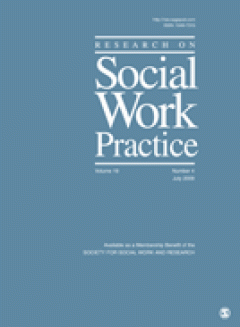
Validation of the Evidence-Based Practice Process Assessment Scale
Objective: This report describes the reliability, validity, and sensitivity of a scale that assesses practitioners’ perceived familiarity with, attitudes of, and implementation of the evidence-based practice (EBP) process. Method: Social work practitioners and second-year master of social works (MSW) students (N = 511) were surveyed in four sites to assess the scale’s internal consistency re…
- Edition
- Vol. 21 no. 1, January 2011.pp. 106-118
- ISBN/ISSN
- 10497315
- Collation
- -
- Series Title
- Research on Social Work Practice
- Call Number
- -
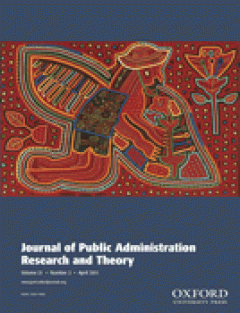
Management Innovation and Organizational Performance : The Mediating Effect o…
Management innovations (MIs) are widely adopted, but their influences on organizational performance are little researched in public settings. Positing that the MI-performance relationship is complex and is conditional over other characteristics of the organization, we examine the influence of MI on organizational performance both directly and indirectly through performance management (PM). PM i…
- Edition
- Vol. 21, Number 2, April 2011.pp. 367-386
- ISBN/ISSN
- 10531858
- Collation
- -
- Series Title
- Journal of Public Administration Research and Theory
- Call Number
- -
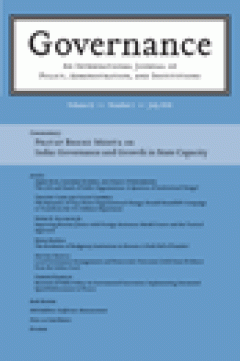
“Modernizing Government” : Mapping Global Public Policy Networks
Public sector reform is a key policy area, driven by global public policy networks. Research on these networks has been inductive, highlighting organizations like the Organisation for Economic Co-operation and Development (OECD). This article examines “virtual policy networks” (VPNs) on the Web. Using IssueCrawler, we conduct a hyperlink analysis that permits us to map seven VPNs. The first net…
- Edition
- Volume 24, Issue 3, July 2011, pages 439–467
- ISBN/ISSN
- 09521895
- Collation
- -
- Series Title
- Governance
- Call Number
- -

The Loss of Governance Capacity through Corruption
Corruption manifests itself in many ways and at different levels. Corrupt behavior causes outrage to victims and those who value civil society, it impedes good government and administrative practice. The policy challenge in reducing corruption is to identify the component parts of corrupt behavior and the risk–reward profiles of offenders. This exploratory article begins this process by reporti…
- Edition
- Volume 24, Issue 3, July 2011, pages 419–438
- ISBN/ISSN
- 09521895
- Collation
- -
- Series Title
- Governance
- Call Number
- -

The Influence of Political Parties on Policy Coordination
Despite an increasing interest in party-state relations, the functions political parties as organizations fulfill in the government apparatus are rarely theorized or empirically examined. Instead of focusing on citizen demands toward parties, this article focuses on the demands of government. It argues that party organizational linkages help integrate an increasingly complex government apparatu…
- Edition
- Volume 24, Issue 3, July 2011, pages 469–494
- ISBN/ISSN
- 09521895
- Collation
- -
- Series Title
- Governance
- Call Number
- -

Procedural Change and the Sources of Ex Ante Constraints in EU Legislation
With 27 member states using a variety of administrative practices and institutions to implement European Union (EU) policy, the EU has been widely used as a natural laboratory for analyzing administrative politics and institutions. This research has largely focused on the institutional relationships as they are at the time of the analysis. However, the EU has used several legislative procedures…
- Edition
- Volume 24, Issue 3, July 2011, pages 495–516
- ISBN/ISSN
- 09521895
- Collation
- -
- Series Title
- Governance
- Call Number
- -

Improving Performance in New Zealand's Public Corporations: The Effect of Gov…
This article examines whether the corporate governance practices recommended by the New Zealand Securities Commission (NZSC) in 2004 have affected the financial performance of public sector corporate entities in New Zealand. The findings indicate that these entities have universally adopted the Securities Commission recommendations by establishing subcommittees for audit and remuneration, and h…
- Edition
- Volume 24, Issue 3, July 2011. pages 517–556
- ISBN/ISSN
- 09521895
- Collation
- -
- Series Title
- Governance
- Call Number
- -

Improving Performance in New Zealand's Public Corporations : The Effect of Go…
This article examines whether the corporate governance practices recommended by the New Zealand Securities Commission (NZSC) in 2004 have affected the financial performance of public sector corporate entities in New Zealand. The findings indicate that these entities have universally adopted the Securities Commission recommendations by establishing subcommittees for audit and remuneration, and h…
- Edition
- Volume 24, Issue 3, July 2011, pages 517–556
- ISBN/ISSN
- 09521895
- Collation
- -
- Series Title
- Governance
- Call Number
- -

Organizational Reputations and the Observability of Public Warnings in 10 Pha…
How does a regulator's reputation affect the public observability of its regulatory errors? I present a verbal model in the policy domain of drug safety that suggests that media coverage of the regulator's errors is a function of the regulator's predominant basis of reputation. Media coverage will be lowest when the regulator has a reputation for scientific expertise in preapproval drug evaluat…
- Edition
- Volume 24, Issue 3, July 2011, pages 557–582
- ISBN/ISSN
- 09521895
- Collation
- -
- Series Title
- Governance
- Call Number
- -

Europeanization and Domestic Employment Policy Change : Conceptual and Method…
The article deals with the differential domestic employment policy adaptation to the European Employment Strategy that occurred over the past years in two European countries—Italy and France. Building on the Europeanization and welfare state change literature, the contribution operationalizes the “goodness of fit” hypothesis and develops a “policy structure” approach for the analysis of domesti…
- Edition
- Volume 24, Issue 3, July 2011, pages 583–605
- ISBN/ISSN
- 09521895
- Collation
- -
- Series Title
- Governance
- Call Number
- -

Measuring and Promoting Budget Transparency : The Open Budget Index as a Rese…
Transparency in public budgeting has been a recognized principle of sound governance for a long time. Yet, reliable measures of budget transparency are hard to come by. This article introduces the Open Budget Index (OBI), a new tool based on surveys by independent researchers that compares key budget information published by governments across the world. Data from the latest survey, published i…
- Edition
- Volume 24, Issue 3, July 2011, pages 607–616
- ISBN/ISSN
- 09521895
- Collation
- -
- Series Title
- Governance
- Call Number
- -
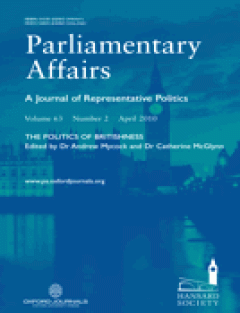
Wets and Dries Resurgent ? Intra-Party Alignments Among Contemporary Conserva…
This article maps new survey data to show that there are three main ideological tendencies among Conservative Party members today and that they differ significantly on a range of contemporary political issues. The Liberal conservatives are the youngest, most male, claim to be the most active of these tendencies, and are distinguished by being the least hostile to Europe and immigration, to envi…
- Edition
- Vol. 64, No. 3, July 2011, pp. 383-402
- ISBN/ISSN
- 00312290
- Collation
- -
- Series Title
- Parliamentary Affairs
- Call Number
- -

How Big is the Big Society?
At the core of David Cameron's vision for revitalizing both the UK and the Conservative party is what he describes as the Big Society. The concept calls for a restructuring of the relationship between state and society, with a substantial movement of power and responsibility from the former to the latter. Alongside a larger role for social enterprises, charities and voluntary organisations in t…
- Edition
- Vol. 64, No. 3, July 2011, pp. 403-424
- ISBN/ISSN
- 00312290
- Collation
- -
- Series Title
- Parliamentary Affairs
- Call Number
- -

The Spatial Approach to the Party Mandate
This article applies spatial theory to the question of the party mandate. The party mandate model provides a system of linkage between citizen's preferences and parliamentary and governmental politics. Existing approaches to the party mandate focus on parties’ governmental mandate: do parties enact their pledges? Instead, the spatial approach looks at the representative aspect of the party mand…
- Edition
- Vol. 64. No. 3, July 2011.pp 425-447
- ISBN/ISSN
- 00312290
- Collation
- -
- Series Title
- Parliamentary Affairs
- Call Number
- -

Rethinking Descriptive Representation : Rendering Women in Legislative Debates
This article addresses debates on identity and interest representation by re-conceptualising descriptive representation. The article revisits Pitkin's original work, arguing that descriptive representatives actively ‘stand for’ their constituents by making claims about group members' needs, circumstances and values. The utility of this re-conceptualisation is explored by analysing parliamentari…
- Edition
- Vol. 64, No. 3, July 2011.pp 448-472
- ISBN/ISSN
- 00312290
- Collation
- -
- Series Title
- Parliamentary Affairs
- Call Number
- -

The Challenge of Consociation in Northern Ireland
This article assesses the role played by the principle of consociational government in promoting Northern Ireland's peace agreement. It reviews the central concept of consociation as it has evolved in recent comparative studies of the politics of divided societies. It describes the stages by which this concept moved to the centre of the political agenda in Northern Ireland, resting on contribut…
- Edition
- Vol. 64, No. 3, Juky 2011.pp 473-493
- ISBN/ISSN
- 00312290
- Collation
- -
- Series Title
- Parliamentary Affairs
- Call Number
- -

Second-Class Representatives or Work Horses? Committee Assignments and Electo…
The Scottish Parliament was designed to break from the traditional Westminster model. Two major changes introduced in the Scottish Parliament were the use of the mixed-member proportional (MMP) system to elect representatives, and the creation of powerful legislative committees. This article links these two areas, by showing that there is a difference in the committee strategies of constituency…
- Edition
- Vol. 64, No. 3, July 2011.pp 494-512
- ISBN/ISSN
- 00312290
- Collation
- -
- Series Title
- Parliamentary Affairs
- Call Number
- -

The Nature of Conservative Party Modernisation Under David Cameron : The Traj…
The modernisation of Conservative Party employment relations policy under David Cameron's leadership has been a contested process, but is divisible into three broad phases. A modernising trend, 2005–2008, was eclipsed by the resurgence of a more established approach, 2008–2010, highlighting the desirability of deregulation, opposition to European Union social and employment legislation, confron…
- Edition
- Vol. 64, No. 3, July 2011.pp. 513-529
- ISBN/ISSN
- 00312290
- Collation
- -
- Series Title
- Parliamentary Affairs
- Call Number
- -

Tolerable Chance or Undesirable Arbitrariness ? Distributing Surplus Votes Un…
Electoral reform is not simply a matter of moving from one system to another. There are variations in the workings of each particular system and it is important for reformers to consider the consequences of each of these variations. For parliaments considering the system of proportional representation by the single transferable vote (PR-STV), as operates in Ireland, one such detail concerns the…
- Edition
- Vol. 64 No. 3, July 2011.pp. 530-551
- ISBN/ISSN
- 00312290
- Collation
- -
- Series Title
- Parliamentary Affairs
- Call Number
- -
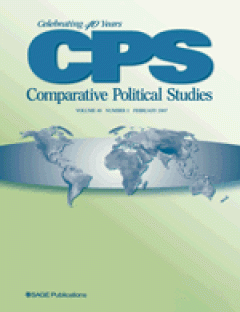
Executive Elections in the Arab World : When and How Do They Matter?
Although elections loom large in the study of nondemocracies, scholars continue debating what function those elections play. This article sets evidence from the Arab world in a global context to evaluate three theorized roles for elections: safety valve, patronage network, and performance ritual. Executive elections in the Middle East and North Africa remain less common and less competitive tha…
- Edition
- Vol. 44 No. 7, July 2011.pp. 807-828
- ISBN/ISSN
- 00104140
- Collation
- -
- Series Title
- Comparative Political Studies
- Call Number
- -
 Computer Science, Information & General Works
Computer Science, Information & General Works  Philosophy & Psychology
Philosophy & Psychology  Religion
Religion  Social Sciences
Social Sciences  Language
Language  Pure Science
Pure Science  Applied Sciences
Applied Sciences  Art & Recreation
Art & Recreation  Literature
Literature  History & Geography
History & Geography